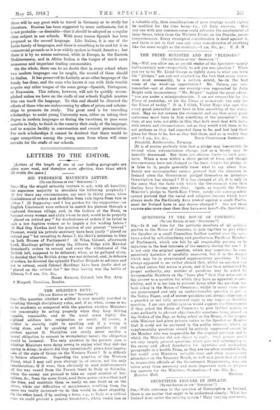THE SOLDIER'S DUTY.
(To THE EDITOR OF THE " SPECTATOR.") Sia,—The question whether a soldier is ever morally justified in breaking through disciplinary rules, and, if BO, when, seems to me to be academic as compared with the question whether Ministers can conceivably be acting properly when they keep driving capable, reasonable, and in the usual sense highly dis- ciplined soldiers into resignation or revolt. Of course, a soldier is morally right in speaking out if a wrong is being done, and by speaking out he can proclaim it and protest against it. Discipline can surely never involve a moral obligation to consent to wrongdoing—never; the obligation would be immoral. The only question iu the present case is whether Ministers were doing wrong in saying what they did—for saying is doing; in short, did they intentionally give a false impres- sion of the state of things on the Western Front ? It is difficult to believe otherwise. Regarding the question of the Western Front, what I may call pure strategy is, of course, not the only consideration; if it were, then obviously to send reinforcements all the way round from the French front to Italy or Salonika, when the enemy can proceed to take an equal number of bat- talions, &c., from the same front, send them across in less than half the time, and maintain them as easily on one front as on the Other, while our difficulties of maintenance resulting from the move are vastly increased—to do this would be sheer stupidity. On the other hand, if by sending a force, e.g., to Italy at a critical time we could prevent a general breakdown, which would lose us a valuable ally, then considerations of pure strategy would rightly be modified for the time being—i.e., till Italy recovers. How any one with any common-sense could advocate the employment of large forces, taken from •the Western Front, on the Danube, passes comprehension. Every strategical consideration is dead against it, and there is not in that case any other consideration of anything like the same weight as the strategic.—I am, Sir, &o., E. H. B.


























 Previous page
Previous page